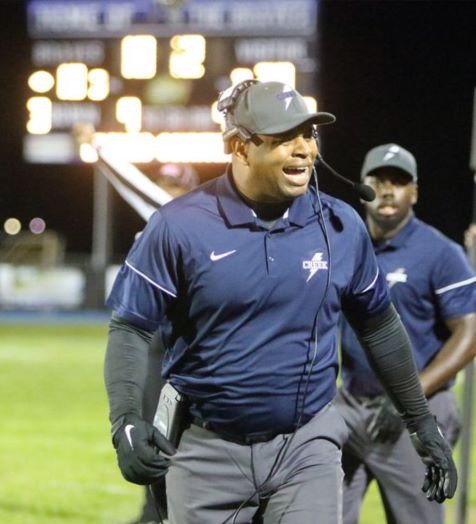Coach Rob Hinson: What it Means to Serve – A Team USA Q&A

Over the years, the U.S. National Football Team has given many players and coaches an opportunity that most don’t get the chance to in their athletic careers: represent their country. The chance to don the red, white, and blue of Team USA has proven to be an experience that many athletes have never forgotten.
For some, the experience is even more meaningful. Some members of Team USA had the distinction and honor of serving in the United States military. This includes Team USA U-18 Defensive Coordinator Rob Hinson. Prior to entering the coaching profession, Hinson – the current Head Coach at Timber Creek Regional High School in Erial, New Jersey – is a 25-year veteran of the United States Air Force.
The chance to coach as part of Team USA was a veritable “no brainer” for Hinson. Given his background, he was eager to get the chance to be a part of the U.S. National Football Team for what it means to the sport and its players.
RELATED CONTENT: Honored to Represent His Country: A Team USA Q&A with Titus Till
EM: Before we talk about your coaching and military careers, let’s talk get a little background on you. When did you first start playing football originally? Do you remember why you wanted, to start playing to begin with?
RH: I begin playing at age 5. I don’t really remember why I started playing except for the fact that it was what you did in my family. Every boy in my family played football. My great uncle was a high school and college coach. My uncles played in high school and college and my cousins and I played also played in high school and in college. All three of us went on to be coaches, as well.

EM: When did you know you wanted to join the military? What influenced you to make that decision?
RELATED CONTENT: Knowing the Real Meaning of Hard Work – A Team USA Q&A with Tyler Smith
RH: I went into the Air Force out of necessity. I didn’t do well the first time around in college. After my sophomore year in high school, I transferred back to Camden High School in Camden, New Jersey from Savannah, Georgia, and school came easy. When I got to college, I had zero study skills, I procrastinated, and my entire focus was on football.
That didn’t work at Lafayette College in the Patriot League, so I was told I would have to go to community college and get grades up in order to return. After being in the city for a while, I realized I needed to get away from everything around me that could have really changed the course of my life. Twenty-five years later, I retired as a Master Sergeant.
EM: Did having football in your background "help" you in your military career at all? If so, can you share how?
RH: Football really helped me initially. I was appealing to return to school, so I was training in preparation for training camp in case they allowed me to return. So, I was in great shape, so it helped me that way. From a larger standpoint, football really helped because it taught me how to be a part of a team, how to be a part of a unit to achieve a singular goal.
EM: That makes sense. Shifting to coaching now, you clearly had the profession as part of your background. When did you know that that’s what you wanted to do?

RH: Before I started coaching, I was doing case management work for adjudicated youth. The treatment plan consisted of legal, family, and school involvement. A few of the kids I was working with played football, so I would go to practices.
Because of that, I became interested in coaching. The head coach at the time, Darrell Wilson, extended an invitation to join the freshman staff. That was in 1995, and I’ve been coaching since.
EM: How would you say your career in the military influenced you as a coach?
RELATED CONTENT: Football, family, America: A US National Team Q&A with Steele Divitto
RH: Besides the basic elements of convincing guys to work together to achieve a common goal, it taught me the importance of setting clear goals and objectives for kids.
Being in the Air Force also taught me the importance of discipline and of holding everyone – both players and coaches – accountable. And it taught me the importance of emphasizing the team and the unit rather than the individual.
EM: Last thing for you Coach, what does having this opportunity to coach Team USA in the International Bowl mean to you?
RH: This will be my second year coaching in the game. It hasn’t become any less significant, it’s still a tremendous honor, and it’s a game I take great pride in coaching in.
Everyone always laughs when I say, “America is the greatest country on the planet,” but they know I mean it. After 25 years of combined military service, active duty, reserves, and air national guard, it shows them how serious I am when I say it.
This game gives me another opportunity to represent this great country!
